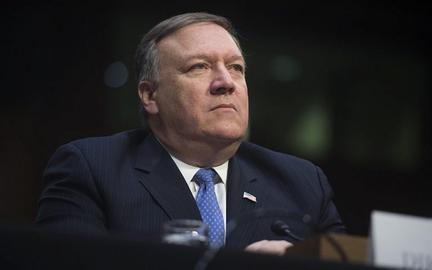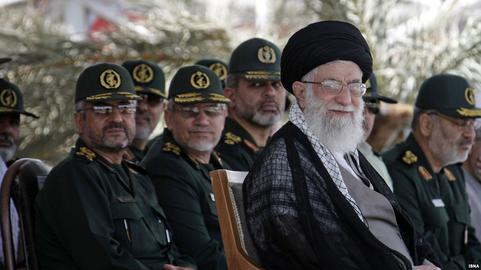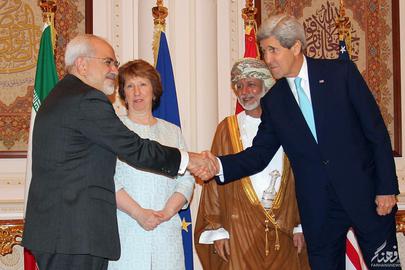Hassan Rouhani, the president of the Islamic Republic, was the first Iranian senior official to respond to the package of 12 demands set out by the US Secretary of State on May 21. But it is clear that Pompeo’s remarks were not directed primarily at the Iranian president.
The three first demands Pompeo made target Iran’s nuclear program. To put it simply, he wants Iran to dismantle its nuclear program in its entirety and allow inspectors from the International Atomic Energy Agency (IAEA) to visit suspected military sites. But in the last five years, senior officials from the Islamic Republic, and especially senior Revolutionary Guards officials, have reiterated time and again that such demands — especially the inspection of military sites — go beyond their red lines.
The fourth demand is to stop Iran’s ballistic missile program. This program is under the total control of the Revolutionary Guards. The Iranian Ministry of Defense plays a role in the program, but the ministry has no say in what its aims are and how it is run.
The fifth demand is to release dual nationals held in Iranian prisons. In this regard, too, the Revolutionary Guards Corps is the responsible party.
Pompeo’s sixth to eleventh demands — abandoning actions and policies in the region including supporting Houthi rebels in Yemen, helping “terrorist groups” such as the Lebanese Hezbollah and the Palestinian Hamas, and military interventions in Syria and Iraq — are also squarely directed at the Revolutionary Guards.
As his twelfth condition, Pompeo declared: “Iran must end its threatening behavior against its neighbors – many of whom are US allies. This certainly includes its threats to destroy Israel, and its firing of missiles into Saudi Arabia and the United Arab Emirates. It also includes threats to international shipping and destructive cyberattacks.” This, too, was directed at the Revolutionary Guards because all the activities that Pompeo refers to are conducted under the command the Guards’ expeditionary Qods Force, the Guards’ Navy and the Guards’ Cyber Army.
In summary, all 12 of the US Secretary of State’s demands are directed at the Revolutionary Guards, which is controlled by the Supreme Leader Ayatollah Khamenei and not, in any way, shape or form, by the government of President Rouhani.
It is important that the American government has decided to address the real actor in Iran. Before the nuclear deal was signed, President Obama’s administration also followed a similar path, and decided to talk to the Supreme Leader — the real decision-maker — instead of only talking to or threatening President Rouhani and his government. This was the motive behind Obama’s 2014 letter to Ayatollah Khamenei. Now Trump’s administration is taking the same approach by addressing the real actor, the Revolutionary Guards.
What is Trump’s Plan of Action?
The first reaction to this approach came from the newspaper Javan, an affiliate of the Guards. In its Tuesday, May 21 issue, it called Pompeo’s speech “empty bluff” and “nonsense.” The paper said that “although the US Secretary of State has unveiled a new US strategy against Iran, he did not produce a plan of action for Washington to realize its wishes...The new American strategy lacks a program to achieve an international consensus around Donald Trump’s long list.” This, in a nutshell, is what the intended recipients of Pompeo’s message argue.
In the battlefield of Syria, they count on Russia as their long-term partner. When it comes to the intricate game of the nuclear deal, they count on the divide between the European Union and the US and constantly refer to reports by the IAEA about Iran’s compliance with its nuclear commitments. And they are well aware that governments in countries such as Lebanon, Iraq and Afghanistan lack the will or the means to push Iran out. All in all, they believe that, for the moment at least, President Trump lacks the ability or a concrete program to create an international consensus against Iran.
It is evident that the Islamic Republic is more afraid of an international consensus against Iran than it is of Trump’s threats. Obama’s government was successful in imposing effective and harsh sanctions against Iran because it succeeded in creating such a consensus, and the leaders of the Islamic Republic learned well that if the US can encircle Iran in this way they have no other option but to surrender.
On the other hand, the failure of the West to find a consensus for dealing with the Syrian crisis taught the Islamic Republic’s leaders that they can do whatever they want and go as far as they want if there is no firm and effective consensus standing in their way. Until and unless Trump’s government manages to create such an international consensus, Ayatollah Khamenei and the commanders of the Revolutionary Guards will continue to brag and thump on their chests — ever louder and louder.
And it has already started. “The people of Iran...will deliver a strong punch to the mouth of the American Secretary of State and anyone who backs them,” said Ismail Kowsari, the deputy commander of the Sarollah Revolutionary Guards base in Tehran, on Tuesday, May 22. “Who are you and America to tell us to limit the range of ballistic missiles? History has shown that with the attacks on Hiroshima and Nagasaki, America is the top criminal with regard to missiles.”
More on Trump’s withdrawal from the nuclear treaty with Iran:
The 12 Demands of Pompeo's New Iran Strategy, May 21, 2018
When Will US Sanctions Hit Iranian Oil Sales?, May 18, 2018
The JCPOA: A Missed Opportunity, May 17, 2018
The Future of Iran’s Economy as the US Bows Out of the Deal, May 10, 2018
What are Iran’s Choices as US Abandons the Nuclear Deal?, May 9, 2018
Khamenei’s “Heroic Flexibility 2.0”, May 9, 2018
What you Need to Know About Trump and the Nuclear Deal, May 8, 2018
visit the accountability section
In this section of Iran Wire, you can contact the officials and launch your campaign for various problems





















comments